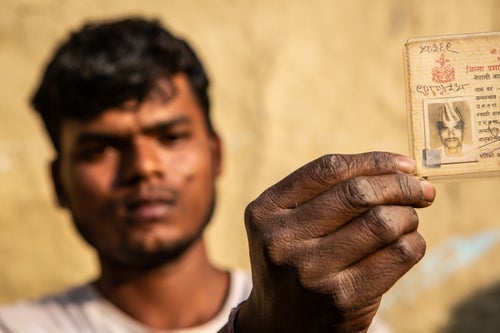A true World Cup legacy: The Nepali children forced to work after their fathers died in Qatar
Organisers of the 2022 World Cup have vowed to leave a legacy in Qatar. However, for some families in Nepal, the tournament has already left an indelible mark on their lives – for the worse. Sebastian Castelier and Quentin Muller report from Kathmandu

The World Cup draw marks a major landmark in a 12-year-long journey that has attracted unprecedented global scrutiny over Qatar’s treatment of its two-million-strong foreign workforce.
VIPs, football teams, coaches, officials and celebrities gathered for the event at the relatively new Doha Exhibition and Convention Centre on Friday. The building and the area it sits in is a testament to the transformation of the Qatari capital.
It is a modern, high-rise area, populated by malls, shops, high-rise offices, glittering hotels and high-end restaurants. Close to the convention centre is a stop for the new and expensively built metro system. A little further down the road are the offices of major energy companies and even the headquarters of the Qatari team organising the World Cup.
Qatar has been anxious to show that its World Cup, the first in the Middle East, will leave a legacy.
Some 3,400km (2,100 miles) away there was little interest at events taking place in the Qatari capital. But there is definitely a legacy.
“My dad went to Qatar three months after my birth; just two years later, he was back, dead. I have no memories of him,” says Utsav*, now 14.
His mother, 50, told The Independent her husband died in an accident when assigned to clean water pipes in Doha.
“He inserted himself inside the pipe to clean it and got stuck there. He could not come out as water flooded in, and he died. I fell unconscious to the ground when I got the shocking news. It hurt my back violently, which still handicaps me,” she says.
Before heading to Qatar, Utsav’s father could not sleep at night, haunted by bills piling up and the upcoming financial burden of marrying off Utsav’s four sisters – in Nepal, the bride’s family have to hand to the groom property, money or valuable assets.
The job in Qatar offered relief as monthly cash transfers started to flow in. But no longer.

“Look at us now; we lost everything. My son even has to work to make up for the loss of my husband’s income. We are in trouble; it is a disaster,” the mother says.
Utsav attends high school but only when work permits. His father's death means he is now the main breadwinner in the family.
To help his mother cover food expenses, the teenager works in agricultural fields and shepherds buffaloes and herds of goats for up to eight hours a day for a daily wage of about 500 rupees, or £3.
“We have no money, so how can I even think about my future?” Utsav says.
Sitting on a thick pile of straw next to him, Sunil Kumar Mahara, a family member, regrets the lack of community-based support for widows and children of deceased migrant workers.
“The chairman of the municipality council has the power to allocate funds to the weakest families in our community. Instead, he focuses on building roads,” he said.
But blaming Nepali officials is an unfair “fig leaf” to brush aside Qatar’s moral responsibility to help families of migrant workers who died oiling the wheels of the emirate’s economy, says Shashi Kumari Yadav, a counsellor in Siraha, southeast Nepal.
“Do they lack funds to provide those children funds to access education, for example, or maybe they simply do not care?” she questions.
Yadav says that among the 4,500 households in villages where she operates, more than 200 have lost a relative working in the Gulf region.
In a quarter of cases, children were forced to take over their fathers’ role of breadwinner and have started working, mainly in agriculture.
“Migrant workers’ deaths play a role in increasing child labour in Nepal. I feel so sad when I see those families sorrowing in pain; it breaks my heart,” she adds.
In 2018, 1.1 million of Nepal’s seven million children worked, according to the UN International Labour Organisation.
From 2019 to 2021, Narad Nath Bharadwaj pleaded the cause of Nepali migrant workers before Qatari officials as ambassador to the World Cup host nation.
According to embassy statistics, about 100 to 150 Nepalis die at the workplace every year in Qatar, he says, adding the rate of fatality among workers is “definitely higher” in the Gulf than in Nepal.
Bharadwaj tells The Independent that as of 2021, roughly one in 30 of the 350,000 Nepali migrant workers in Qatar toiled to build Fifa World Cup stadiums.
It is “difficult to say with certainty” because Qatar does not release segregated statistics, the former diplomat says.
A report released in March 2022 by a coalition of human rights organisations found that as many as 10,000 migrant workers from south and southeast Asia appear to die every year in the Gulf Cooperation Council countries – Kuwait, Bahrain, Saudi Arabia, Qatar, the United Arab Emirates and Oman.
More than half of those deaths are unexplained, the report revealed. Migrant workers in the Gulf region, one of the world’s hottest in summertime, are vulnerable to hot temperatures and risk cardiac arrest. Employers are also accused of violating workers’ rights in a number of ways including confiscating passports, delaying wage payments or reducing minimum rest times.
Human rights groups are increasingly calling for compensation to be paid to families of those who have died in Qatar in the run-up to the tournament and called on national teams, who have vowed to carry out some form of protest during the World Cup, to lend their voices to such a campaign.
Qatar has bowed to intense international pressure over its treatment of migrant workers. It launched a non-discriminatory minimum wage and largely dismantled its derided “kafala” labour system, which prevented workers to change jobs or leave the country without the permission of their boss.
Sitting in the dust, wearing a dirty T-shirt with the word “Freedom” emblazoned across it, Krishna, 19, hits a metal bar with a hammer.
After his father died of Covid-19 in Qatar in early 2020, Krishna experienced symptoms of depression.
He had to leave school at 17 to start working in the construction sector, following in his father’s footsteps. During the pandemic, low-income migrant workers were parked by employers in Qatar in overcrowded labour camps outside of Doha, with little possibility to self-isolate and were subsequently at high risk of infection.
Ramsulu worked for about a decade to make concrete for World Cup stadiums to send home enough money to guarantee education and three meals a day for his four children.
“My dad returned home only three times in 11 years. He sacrificed his life to build Qatar but when he died, the company never called us, nor did Qatari authorities. We were left in the dark. One of my fathers’ friends, informed by the company, called 12 days after he passed away,” he said.
There is more to it. According to Krishna, the company never wired to Nepal the end-of-service gratuity owed for his fathers’ decade-long tenure.
“I do not know the amount, but it must be big. If the company would send it, we could build a proper house with bricks,” he says.
“I do not care about whether they will organise the World Cup 2022 or not, what I care about is to solve our economic crisis, to pay my brothers’ school fees,” Krishna adds, angrily. One of Krishna’s brothers, who is seven, left school too and works for a fish farm in northern Nepal.
The Nepali government is not insensitive to the suffering of its citizens, argues Rajan Prasad Shrestha, executive director of Nepal’s Foreign Employment Promotion Board (FEPB), the government agency responsible for the welfare of migrant workers, including compensations.
He says families of “each and every single person” who dies working abroad, excluding those who migrated through unregistered channels, receive up to NPR 700,000 (£4,410) in financial support from the board. On top of that, it provides scholarships to children up to grade 12 and assists families to get NPR 1.4 million in compensation from insurance companies.
Many human tragedies slip through the cracks, though. Not everyone is aware of the FEPB’s compensations systems or has the knowledge to get the hang of the application procedure, particularly among Nepal’s uneducated communities.
Qatar’s record of migrant workers’ death excludes those sent back home to die.
Ram Mandal returned to Nepal in June 2021, suffering from kidney failure after four years of working in Qatar as a cleaner, during which delayed wages forced him to starve.

The employer refused to provide food as requested by Qatari laws. Twenty days later, he died. “My husband was fit before going; things started to deteriorate there. He would repeatedly complain about poor water quality. It has a bad smell, he said. Isn’t the company responsible for providing drinkable water in sufficient quantities? I feel bad water caused his death,” said widow Gayatri Mandal.
Hospitalised in Qatar, Ram Mandal eventually requested to return home to seek a kidney transplant from one of his family members. Nepal limits potential donors to immediate relatives, thus often leaving migrant workers with no choice but to return home to undergo the transplant procedure.
Mandal’s mother volunteered to give him a kidney, but he died before the family could secure funds after the Qatar-based firm became unresponsive to calls for payments to help fund the operation.
A month later, the family’s only son, Manish, 13, had to leave school to go work for a brick factory on the outskirts of the village.
“Nobody is helping us; only he, although a child, can make money to put food on the table. Education is out of the question for now, and if we lack options when he turns 18, he will grab a passport and go to the Gulf, like his dad. We are too poor to choose,” the widow says.
Can Nepali diplomacy be a force of change to demand greater welfare for the families of deceased migrant workers?
“Gulf countries have options, right? They can find workers elsewhere if one country is not ready to cooperate. I think that is their policy to get their interests served,” said Narad Nath Bharadwaj.
Tired of seeing two to three migrant workers return in coffins to Kathmandu’s Tribhuvan airport every day and many more physically disabled, Rajan Prasad Shrestha from the FEPB questioned the social cost of Gulf migration.
“It is not benign. Whether direct or indirect, it comes at a high cost to society, our economy and the government. Labour migration has become a necessary evil for communities in Nepal.”
“When I see pictures of my dad, I remember him and feel heavy deep in my heart,” Krishna says, wiping away a tear.
“He was one of the beautiful souls in the village. When he died, not only did I lose a father, but I lost guidance, my life’s northern star, my role model.”
Join our commenting forum
Join thought-provoking conversations, follow other Independent readers and see their replies
Comments


Bookmark popover
Removed from bookmarks